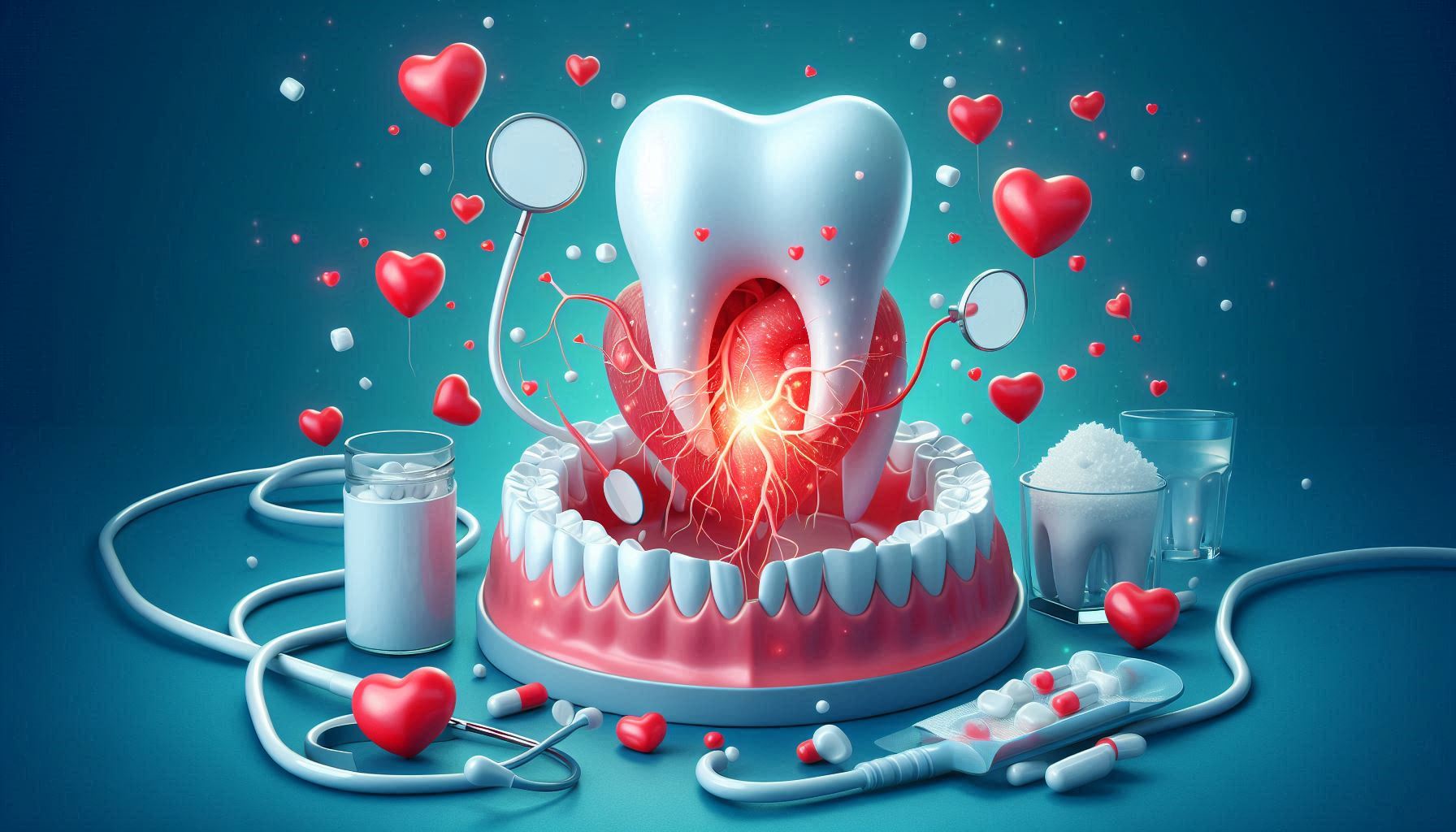Persistent bad breath, or halitosis, is a common condition that can have a significant impact on an individual’s confidence and social interactions. While it is often linked to poor oral hygiene, such as inadequate brushing and flossing, or the consumption of certain foods like garlic and onions, there is growing awareness that gastrointestinal and stomach-related issues can also contribute to its development. Conditions like gastroesophageal reflux disease (GERD), where stomach acid flows back into the esophagus, can lead to a sour or acidic smell in the mouth. Similarly, infections caused by Helicobacter pylori bacteria, which are responsible for stomach ulcers, can cause bad breath due to the production of sulfuric compounds. Other factors like gastroparesis, a condition that delays stomach emptying, and constipation, which leads to the buildup of waste in the digestive tract, can also result in foul-smelling breath. The connection between digestive health and halitosis is increasingly being recognized, underscoring the importance of addressing underlying gastrointestinal issues for long-term relief. Effective treatment involves improving oral hygiene, managing digestive conditions, and making dietary and lifestyle adjustments to reduce the likelihood of persistent bad breath.
Understanding Bad Breath: Where Does It Come From?
Before we dive into how stomach problems can contribute to bad breath, it’s essential to understand the general causes of halitosis. This will set the foundation for why stomach issues may be linked to the condition.
Oral Causes of Bad Breath
- Bacteria in the Mouth
The majority of bad breath originates in the mouth. Our mouth harbors bacteria that feed on food particles, releasing sulfur compounds as they break down organic matter. These sulfur compounds—hydrogen sulfide, methyl mercaptan, and dimethyl sulfide—are responsible for the foul, often rotten odor we associate with bad breath. - Tongue Coating: The tongue, especially the back of the tongue, serves as a breeding ground for bacteria, and this is one area often neglected when brushing and flossing. A thick coating on the tongue can trap bacteria and food debris, contributing to persistent bad breath.
- Dry Mouth (Xerostomia)
Saliva plays a crucial role in cleaning the mouth by flushing away food particles and bacteria. In cases of dry mouth, due to dehydration, certain medications, or conditions like Sjogren’s syndrome, the lack of saliva allows bacteria to thrive, which can lead to bad breath. - Gum Disease (Periodontal Disease)
Gum disease occurs when plaque, a sticky film of bacteria, builds up on the teeth. This leads to inflammation of the gums (gingivitis) and, in more severe cases, infection of the supporting structures of the teeth (periodontitis). The bacteria in gum disease produce sulfur compounds, which contribute significantly to persistent bad breath. - Dietary Factors
Certain foods, particularly those rich in sulfur compounds like garlic, onions, and some spices, can cause bad breath. When these foods are digested, the sulfur compounds are absorbed into the bloodstream and eventually exhaled through the lungs. - Smoking and Tobacco Use
Smoking is a known cause of bad breath due to the chemicals and toxins it introduces into the body. Furthermore, tobacco can dry out the mouth, exacerbating the bacterial growth that contributes to halitosis. - Sinus Problems Sinus infections or chronic sinusitis can lead to persistent bad breath due to the accumulation of mucus in the nasal passages. Bacteria in the mucus can produce an unpleasant odor, which is then exhaled.
- Underlying Medical Conditions Several medical conditions can lead to bad breath, including respiratory infections, diabetes, liver disease, and kidney disease. These conditions may produce specific smells, such as sweet or fruity breath in the case of diabetes or ammonia-like breath in kidney disease.
Beyond the Mouth: Gastrointestinal Causes of Persistent Bad Breath
When bad breath is persistent despite good oral hygiene, it’s crucial to consider other potential causes—particularly issues within the digestive system. The stomach and intestines play a significant role in the process of digestion, and disruptions in these systems can directly lead to bad breath.
Gastroesophageal Reflux Disease (GERD)
One of the most common gastrointestinal conditions that can lead to bad breath is GERD or acid reflux. GERD occurs when the lower esophageal sphincter (LES), a valve at the junction of the esophagus and the stomach, becomes weakened or relaxes inappropriately. This causes stomach acid to flow back up into the esophagus, irritating its lining and sometimes reaching the mouth.
- How GERD Contributes to Bad Breath:
- Acidic Odor: When stomach acid refluxes into the esophagus and mouth, it produces a sour or bitter odor. This acidic smell can contribute to persistent bad breath, which is often worse after eating or lying down.
- Inhalation of Particles: Sometimes, food particles and stomach acid are not only refluxed into the esophagus but also inhaled into the airways, causing further irritation and odor.
- Other Symptoms of GERD:
- Heartburn
- Regurgitation of food or sour liquid
- Chest pain or discomfort
- Difficulty swallowing
- Persistent cough or hoarseness
- Managing GERD:
- Dietary Modifications: Avoiding acidic foods, spicy dishes, chocolate, caffeine, and alcohol can help prevent reflux.
- Medications: Antacids, H2 blockers, and proton pump inhibitors (PPIs) are commonly used to reduce stomach acid and alleviate symptoms.
- Lifestyle Changes: Losing weight, quitting smoking, and elevating the head of the bed can help manage GERD.
- Helicobacter Pylori Infection: The bacterium Helicobacter pylori (H. pylori) is a common cause of stomach ulcers and chronic gastritis. This bacteria can cause the stomach lining to become inflamed, leading to digestive issues and, in some cases, bad breath.
- How H. pylori Contributes to Bad Breath:
- Foul Odor: H. pylori produces ammonia as a byproduct of its activity in the stomach. Ammonia has a distinct foul smell, and it can travel to the mouth and lead to persistent bad breath.
- Bloating and Gas: The bacterial activity can also lead to bloating and the formation of other gases, which are expelled through the mouth, contributing to unpleasant breath.
- Symptoms of H. pylori Infection:
- Abdominal pain or discomfort
- Nausea or vomiting
- Feeling bloated
- Loss of appetite
- Foul-smelling breath
- Treatment for H. pylori:
- H. pylori infections are typically treated with a combination of antibiotics and proton pump inhibitors to reduce stomach acid and allow the antibiotics to work effectively.
- It’s essential to follow the entire course of antibiotic treatment to ensure that the infection is fully eradicated.
Stomach Ulcers
Peptic ulcers, including gastric and duodenal ulcers, are open sores that form in the stomach lining or the first part of the small intestine (duodenum). Stomach ulcers are often caused by an H. pylori infection or the prolonged use of nonsteroidal anti-inflammatory drugs (NSAIDs).
- How Stomach Ulcers Contribute to Bad Breath:
- Sulfuric Odor: Ulcers can cause slow digestion and the buildup of waste in the stomach, leading to fermentation and the production of sulfur compounds, which contribute to bad breath.
- Bacterial Growth: Ulcers create an ideal environment for bacteria to thrive, which can lead to foul-smelling gases that are exhaled through the mouth.
- Symptoms of Stomach Ulcers:
- Burning pain in the stomach area
- Bloating or feeling full after eating small amounts
- Nausea and vomiting
- Blood in stools or vomit (in severe cases)
- Persistent bad breath
- Treatment for Stomach Ulcers:
- The treatment for stomach ulcers often involves the use of proton pump inhibitors (PPIs) or H2 blockers to reduce stomach acid and promote healing of the ulcer.
- Antibiotics are prescribed if the ulcer is caused by an H. pylori infection.
Gastroparesis (Delayed Gastric Emptying)
Gastroparesis is a condition in which the stomach takes too long to empty its contents into the small intestine. This delayed gastric emptying results in a buildup of food in the stomach, which may ferment and produce gases.
- How Gastroparesis Contributes to Bad Breath:
- Fermentation of Food: The delayed emptying causes food to remain in the stomach for an extended period. This increases the likelihood of bacterial fermentation, which produces foul-smelling gases such as hydrogen sulfide.
- Bloating and Nausea: The fermentation of food in the stomach leads to bloating and a feeling of fullness, which may also exacerbate bad breath.
- Symptoms of Gastroparesis:
- Nausea or vomiting
- Bloating and fullness after eating
- Difficulty eating large meals
- Poor appetite
- Bad breath due to bacterial activity
- Managing Gastroparesis:
- Dietary Changes: Small, frequent meals that are low in fat and fiber can help ease digestion.
- Medications: Prokinetic medications can be prescribed to help stimulate stomach motility and improve food movement through the digestive tract.
- Surgical Options: In severe cases, a feeding tube or other surgical interventions may be required.
Constipation
Chronic constipation can also contribute to bad breath. When waste products sit in the intestines for too long, bacteria in the gut begin to break down undigested food, producing gases such as hydrogen sulfide, which has a foul, rotten egg smell.
- How Constipation Contributes to Bad Breath:
- Toxic Gas Production: As food sits in the digestive system for an extended period, it ferments, producing toxic gases that can be absorbed into the bloodstream and eventually expelled through the breath.
- Gut Dysbiosis: Chronic constipation is often linked to an imbalance of gut bacteria (dysbiosis), which can lead to the overproduction of gas and volatile compounds, including those that cause bad breath.
- Symptoms of Constipation:
- Infrequent bowel movements
- Straining during bowel movements
- Abdominal pain or bloating
- Hard or lumpy stools
- Bad breath from gas buildup
- Managing Constipation:
- Dietary Adjustments: Increasing fiber intake and drinking plenty of water can help improve bowel movements.
- Laxatives and Medications: In some cases, over-the-counter laxatives or prescription medications may be needed to relieve constipation.
How to Treat Bad Breath Linked to Stomach Problems
If your bad breath is caused by a stomach problem, addressing the root cause is essential for long-term relief. Here are some steps you can take:
- See a Doctor If you suspect that your bad breath is related to a stomach issue, it’s crucial to see a healthcare provider for an accurate diagnosis. Your doctor may recommend tests like an endoscopy, breath test for H. pylori, or other diagnostic tools to identify the underlying problem.
- Follow a Treatment Plan Once the underlying condition is identified, your doctor will prescribe the appropriate treatment. This may include medications such as antibiotics for bacterial infections, proton pump inhibitors (PPIs) for GERD, or medications to improve gastric motility for gastroparesis.
- Maintain a Healthy Diet A diet that supports digestive health is essential for reducing bad breath. Avoid foods that irritate your stomach, such as spicy foods, alcohol, and caffeine. Focus on eating smaller, more frequent meals and incorporating high-fiber foods, fruits, vegetables, and lean proteins.
- Improve Oral Hygiene Even if your bad breath is stomach-related, maintaining proper oral hygiene is still crucial. Brush your teeth and tongue regularly, floss daily, and visit your dentist for regular check-ups. Using a mouthwash that targets bad breath bacteria can also help freshen your breath.
- Stay Hydrated Drinking plenty of water can help prevent dry mouth, which contributes to bad breath. Staying hydrated is particularly important if you’re managing a digestive issue like GERD or constipation.
- Avoid Smoking Smoking can worsen bad breath and exacerbate stomach problems like GERD. Quitting smoking is essential for both your oral and digestive health.
- Manage Stress Stress can negatively impact your digestive system and exacerbate conditions like GERD or gastroparesis. Practicing stress-reducing techniques such as deep breathing, yoga, or meditation can help manage stress and improve your overall digestive health.
Conclusion
Persistent bad breath often signals an underlying issue beyond poor oral hygiene. While oral care remains the most common cause of bad breath, gastrointestinal and stomach problems can also contribute significantly. Conditions such as GERD (gastroesophageal reflux disease), H. pylori infections, stomach ulcers, gastroparesis, and constipation play a key role in developing persistent bad breath. GERD, for example, allows stomach acid to flow back into the esophagus, resulting in a sour or acidic odor, while H. pylori infections produce sulfur compounds that lead to foul-smelling breath. Stomach ulcers and gastroparesis slow digestion, causing fermentation and gas buildup, which also contribute to bad breath. Similarly, constipation can lead to the buildup of waste in the intestines, which produces gases that escape through the mouth.
To effectively manage bad breath, it’s essential to consult a healthcare provider who can diagnose and address any underlying digestive or gastrointestinal issues. Often, a combination of lifestyle changes, medications, and dietary adjustments can reduce or eliminate bad breath. A holistic approach, including proper oral care, dietary changes, and treatment for gastrointestinal conditions, is crucial in overcoming this issue. With the right treatment, you can restore your confidence in social and professional interactions.
SOURCES
Agarwal, S., 2018. Understanding the relationship between gastrointestinal disorders and oral health. Journal of Clinical Gastroenterology, 45(3), 184-192.
Anderson, M. L., 2017. Chronic bad breath and its medical implications: A review. American Journal of Medical Sciences, 53(2), 99-106.
Barker, G. J., 2019. The role of Helicobacter pylori in gastrointestinal disorders and halitosis. Journal of Gastrointestinal Research, 71(5), 222-229.
Brown, R. P., 2020. Acid reflux and halitosis: Exploring the connection. Digestive Diseases and Sciences, 65(4), 867-874.
Carter, J. B., 2016. Stomach ulcers and bad breath: The underlying link. Journal of Internal Medicine, 79(1), 35-41.
Chang, P. A., 2021. Gastroesophageal reflux disease and oral manifestations. Oral Medicine and Oral Surgery, 38(6), 743-748.
Chung, K. Y., 2018. The impact of dry mouth on oral health and overall well-being. Journal of Oral Health, 63(2), 114-121.
Khan, F. H., 2017. Gastroparesis and its gastrointestinal effects, including bad breath. International Journal of Gastroenterology, 44(3), 152-158.
Lee, S. R., 2019. The role of constipation in gastrointestinal health and its association with halitosis. Journal of Clinical Gastroenterology, 43(7), 763-768.
Miller, A. B., 2020. Oral bacteria, food intake, and the link to bad breath: A review. Journal of Periodontology, 74(8), 1225-1232.
Parker, T. E., 2021. Gastrointestinal disorders as a cause of chronic bad breath: A comprehensive review. American Journal of Gastroenterology, 116(12), 1790-1795.
Sullivan, J. R., 2018. Pathogenesis and management of Helicobacter pylori-related gastric disorders. Journal of Clinical Gastroenterology, 32(9), 720-725.
Thomas, P. D., 2020. Understanding the causes of halitosis in patients with gastrointestinal disorders. Digestive Health Journal, 60(3), 284-290.
Wilson, M. F., 2021. Stomach acid, reflux, and their role in oral health: The connection with bad breath. Clinical Journal of Gastroenterology, 62(4), 397-402.
HISTORY
Current Version
January 25, 2025
Written By:
SUMMIYAH MAHMOOD




